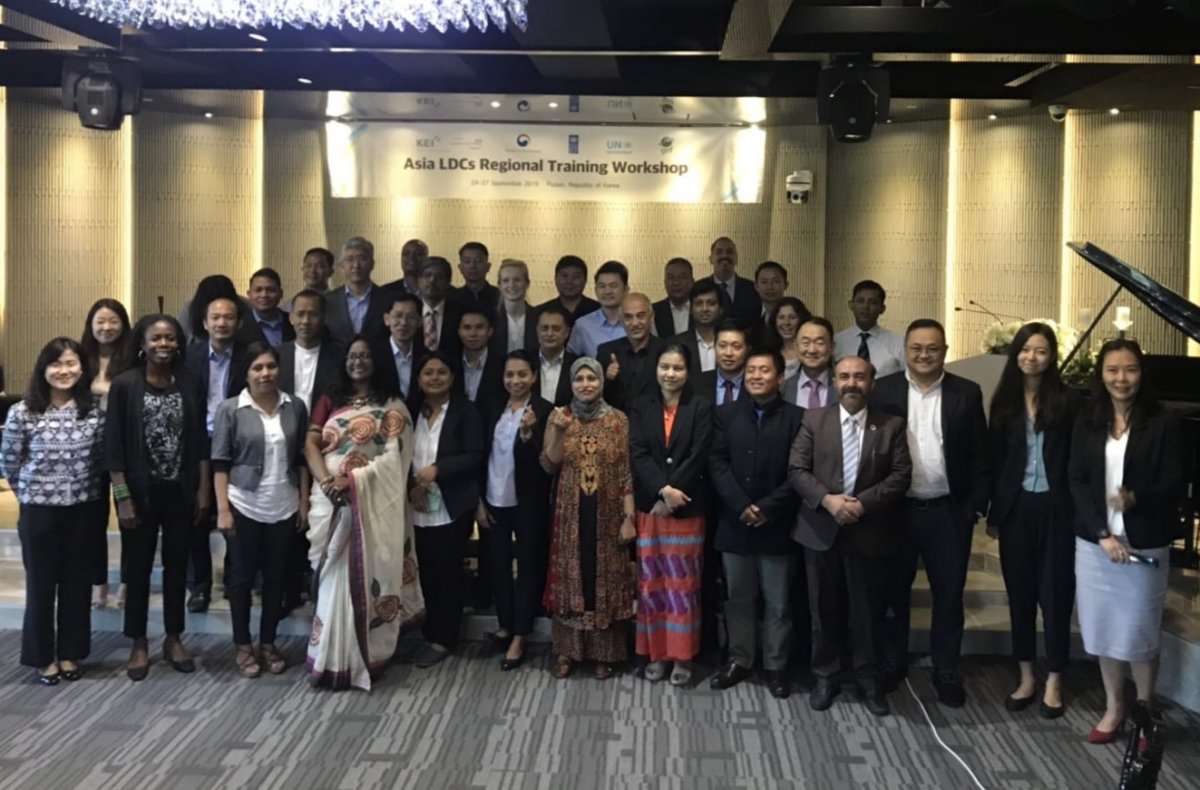Regional Training on Accelerating National Adaptation Plans and Integrating Transboundary Climate Risks into the NAP Process
| Sun | Mon | Tue | Wed | Thu | Fri | Sat |
|---|---|---|---|---|---|---|
|
|
|
|
1
|
2
|
3
|
4
|
|
5
|
6
|
7
|
8
|
9
|
10
|
11
|
|
12
|
13
|
14
|
15
|
16
|
17
|
18
|
|
19
|
20
|
21
|
22
|
23
|
24
|
25
|
|
26
|
27
|
28
|
29
|
30
|
31
|
|
24 September 2019 to 27 September 2019
This regional training was organized in partnership with Ministry of Environment, Republic of Korea and Korea Environment Institute (KEI)-Korea Adaptation Center for Climate Change (KACCC) with the objective to help countries accelerate their national adaptation planning process, provide exchange of lessons on national adaptation planning and integrate transboundary considerations into adaptation planning.
The workshop was attended by representatives from Afghanistan, Bhutan, Bangladesh, Cambodia, Lao PDR, Myanmar, Nepal and Timor-Leste. Among the participants were UNFCCC focal points and representatives from Ministry of Environment of Ministry of Finance & Planning as well as other stakeholders involved in the NAP process. The workshop took place at Centum Premier Hotel, Pusan, Republic of Korea, 24-27 September 2019.
Workshop agenda
List of participants
Press release
 Representatives of governments from Least Developed Countries in Asia region are attending a regional training on Accelerating National Adaptation Plans and Integrating Transboundary Climate Risks into the National Adaptation Planning (NAP) Process with the support of UNEP and UNDP through the Global Environment Facility (GEF)-funded National Adaptation Plan Global Support Programme (NAP-GSP), in partnership with Korea Environment Institute (KEI).
Representatives of governments from Least Developed Countries in Asia region are attending a regional training on Accelerating National Adaptation Plans and Integrating Transboundary Climate Risks into the National Adaptation Planning (NAP) Process with the support of UNEP and UNDP through the Global Environment Facility (GEF)-funded National Adaptation Plan Global Support Programme (NAP-GSP), in partnership with Korea Environment Institute (KEI).
Representatives from Afghanistan, Bangladesh, Bhutan, Cambodia, Lao PDR, Myanmar, Nepal and Timor-Leste, including UNFCCC focal points and representatives from Ministry of Environment and Ministry of Finance & Planning as well as other stakeholders involved in the NAP process are coming together to accelerate NAP process
24 September 2019, Pusan, Republic of Korea: With the goal to increase the capacity of policy makers to advance the implementation of NAPs, the NAP-GSP Regional Training Workshop for LDCs in Asia-Pacific on accelerating NAPs and Integrating Transboundary Climate Risks into the NAP Process – held from 24-27 September 2019 – will focus on promoting innovative responses to adaptation needs in the Asia-Pacific including the consideration of transboundary climate adaptation.
LDCs within the Asia-Pacific region are calling for accelerated adaptation actions and innovative solutions to the challenges which climate change poses to this vulnerable region.
Climate change is already affecting societies across Asia-Pacific. Increased climate variability is being observed in the region, including warming of atmospheric and sea surface temperatures, sea level rise, melting of glaciers, and an increase in extreme weather events. While adaptation is usually being framed as a national and local issue, the broader international dimensions gives reason to explore transboundary risks that result from both impacts of climate change and the effect of adaptation interventions.
Dr Hoon Chang, Director of the Korea Adaptation Center for Climate Change (KACCC), stressed in his opening remarks that “bringing NAPs and transboundary issues together is of utmost importance. At the same time bringing together a wide range of actors and stakeholders to promote exchange of experiences and foster partnerships is how we can learn together to advance NAPs and transboundary adaptation.”
Mr Motsomi Maletjane, UNFCCC Team Lead for NAPs and Adaptation Policies, reflected on the importance of preparing adaptation plans and the need to accelerate the process in Least Developed Countries. “LDCs are not moving as fast as they can. We need to ensure they are at the forefront of developing NAPs.”
The workshop is an activity under the joint UNDP-UNEP National Adaptation Plan Global Support Programme (NAP-GSP), funded by the Global Environment Facility (GEF). It as organized in partnership with Ministry of Environment, Republic of Korea and KEI-KACCC.
This four-day event provided a platform and opportunities for knowledge exchange on the NAP process, transboundary considerations, accessing climate finance and other key issues - through interactive sessions designed to expedite NAP implementation and promote innovation.
Presentations
DAY 1:
Session 1 - The National Adaptation Plan and the process to support the formulation and implementation
Session 2 - National Adaptation Plan essential elements
Session 3 - Korean NAP Experiences and Lessons Learned
Session 4 - Challenges and needs of LDCs in Asia on NAPs
Session 5 - Step-wise Process of NAP
DAY 2:
Session 1 - Transboundary climate change issues: overview
Session 2 - Transboundary adaptation: challenges and recommendations
Session 3 - Practices and approaches to establishing and maintaining transboundary coordination (Mekong River Basin)
Session 4 - Transboundary adaptation in mountain ecosystems
Session 5 - The Hindu Kush Himalaya Assessment: mountains, climate change, sustainablity and people
DAY 3:
Session 1 - Adaptation without borders: understanding indirect climate risk
Session 2 - Group work on addressing indirect impacts in your NAPs
Session 3 - Sector focus: transport
DAY 4:
Session 1 - Entry points for integrating transboundary climate risks in the NAP process
Session 2 - GCF Readiness window - opportunities for the NAP process
Session 3 - Overview of international financing landscape
Session 4 - Cambodia's Experience to access NAP GCF Readiness support
Session 5 - Nepal's experience in accessing GCF funding to advance their NAP process
Session 6 - LEG Guidance on NAP structure and contents
Session 6.1 - General outline prototype one NAP structure and contents